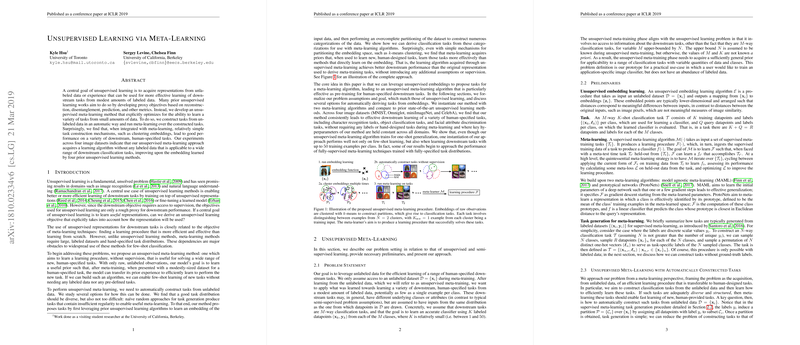Essay on "Unsupervised Learning via Meta-Learning"
The paper "Unsupervised Learning via Meta-Learning" explores a novel approach to unsupervised learning, emphasizing the development of unsupervised meta-learning methods as a means of effectively utilizing unlabeled data for transferable learning across diverse downstream tasks. The authors, Hsu, Levine, and Finn, delve into a significant challenge within machine learning: creating representations from unlabeled data that are valuable for further learning tasks without substantial labeled data reliance.
Methodology and Approach
The central premise of this work is to employ unsupervised meta-learning to optimize the ability to learn a series of tasks using only small data amounts. The method involves automatically constructing tasks from unlabeled data and applying meta-learning over these tasks. The construction of tasks is accomplished through relatively simple mechanisms such as clustering embeddings, which, when combined with meta-learning, yield impressive performance on a variety of downstream tasks.
A notable insight from the paper is that even basic task construction techniques, such as using -means clustering on embeddings created through unsupervised techniques, can lead to effective learning algorithms. This method, called CACTUs (Clustering to Automatically Construct Tasks for Unsupervised meta-learning), allows for the automatic generation of numerous tasks from an unlabeled dataset.
Experimental Validation
The authors validate their methods through extensive experimentation across four image datasets: MNIST, Omniglot, miniImageNet, and CelebA. The performance is benchmarked against four prior unsupervised learning methods, demonstrating that the unsupervised meta-learning approach provides superior learning algorithms for downstream classification tasks. The experiments include various few-shot learning tasks, revealing that the meta-learned algorithms can handle a wide range of learning scenarios efficiently.
CACTUs is instantiated with two prevailing meta-learning algorithms: Model-Agnostic Meta-Learning (MAML) and Prototypical Networks (ProtoNets). These implementations consistently outperform several baseline unsupervised learning methods, underscoring the utility of unsupervised meta-learning in generating effective representations for new tasks.
Implications and Future Directions
The implications of this research are profound, particularly in contexts where labeled data is scarce. By improving upon the foundational representation learned through unsupervised methods, this approach enhances transferability and efficiency in learning downstream tasks, which is a crucial attribute in real-world applications.
The paper opens avenues for further exploration in unsupervised task construction, urging the community to investigate novel mechanisms beyond -means clustering. Furthermore, as unsupervised representation learning techniques continue to evolve, integrating such advancements with meta-learning could potentially lead to more refined and adaptable learning systems.
In summary, "Unsupervised Learning via Meta-Learning" presents a compelling case for leveraging unsupervised data through meta-learning frameworks, contributing significantly to the development of more autonomous and versatile AI systems. This methodological innovation holds promise for shifting the boundaries of what unsupervised learning can achieve, driving advancements in both theoretical understanding and practical implementations.
